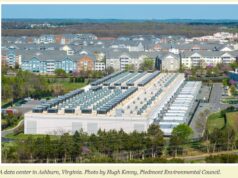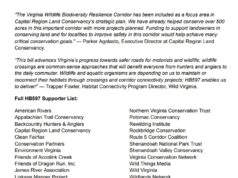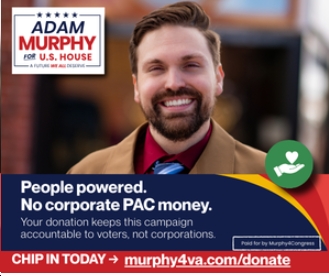UPDATE 2:10 pm: I’m told that Del. Plum’s bill (HB2173) is basically just a “definitional” bill, emphasizing that chemical recycling is a “manufacturing process.” Similar deal with SB1164. So…while the substantive information provided below regarding “chemical recycling” is correct, the impact of the two bills doesn’t appear to be particularly (or at all?) harmful, as I’d been led to believe by my sources on this. On the other hand, I’m also being told that these bills would be a first step, and that we can be sure that the industry wants to build on this in the future if they are successful in this case. So…not sure, honestly, at this point.
UPDATE #2: Del. Plum notes that “the essence of the bills” is that “An ‘advanced recycling facility’ shall be subject to all applicable federal and state environmental laws and regulations.” Del. Plum adds, “In other words, regardless of what these industries call themselves, they must meet all federal and state environmental rules, regulations, and laws to ensure that these industries do not represent step backwards on environmental protections.”
****************************************
Cover image courtesy of Greenpeace
Right now, while many of us are paying attention to other things after such a stressful few months, Virginia is at risk for falling victim to a sophisticated “greenwashing” campaign. Two bills rapidly moving forward this Virginia General Assembly session – SB1164 and HB2173 – could expand the plastic burning industry in Virginia, by defining this polluting practice with a rosy, misleading name — “chemical recycling.” In fact, chemical recycling (also described inaccurately as “advanced recycling”) refers to a process in which waste, predominately plastic, is heated at high pressures in order to break down the substance back to oil. Despite the implied environmental benefits of its name, “advanced recycling” is a carbon-intensive process that damages our climate and pollutes the air of communities sited near these facilities. Should either of these bills pass, Virginia could open the door to the expansion of an unnecessary and underdeveloped industry that sneakily attempts to have itself classified as something it is not. The cold hard truth is that the bills could incentivize a pollution-based industry.
SB1164 and HB2173 represent textbook examples of “greenwashing,” which is among the many reasons why environmental groups, led by the Virginia Conservation Network (VCN) have come out in opposition to these bills in the last few days. These bills certainly should not be rocketing through the General Assembly unchallenged, so it’s vital that we set the record straight on their potential impact.
First and foremost, these bills are pushed by polluters in other states. In 2017, the chemical and plastics industry launched an initiative with the American Chemistry Council (formerly known as Chemical Manufacturers’ Association) to create a market for plastic waste management — as opposed to simply eliminating plastics from waste sources. The ACC has successfully achieved legislative or administrative changes to relax or eliminate environmental safeguards for the purpose of burning plastic in at least 13 states and spent $7.5 million on lobbying efforts in 2018 alone.
Second, there’s nothing “advanced” about this form of chemical recycling. About half of the carbon content of waste plastics is released as carbon pollution gases during the process. As Virginia seeks to transition away from fossil fuels, passing this bill would leave retired and retiring fossil fuel plants open for repurposing — meaning that we would be replacing one climate change inducing plant with another.
Third, chemical recycling perpetuates environmental injustice. About 80 percent of all plants that burn plastic and waste substances to produce energy are located in low-income and communities of color. As Clean Fairfax points out in their blog, these facilities expose residents to harmful pollution that toxifies the air with particulate matter including arsenic, lead, mercury, and many other harmful compounds that cause cancer, respiratory illnesses, and neurological disorders.
For more information on why industry claims about “chemical recycling” of plastics don’t hold up to scrutiny, see this report by Greenpeace, which “shows how the American Chemistry Council is using the fantasy of chemical recycling to mislead investors, governments, and the public into believing that we can recycle our way out of the plastic pollution crisis.” Among the report’s key findings were:
| Less than 50% of the projects on the ACC’s list of “advanced” recycling met our basic criteria to be deemed credible plastic
recycling projects; the rest were either waste-to-fuel/plastic-to-fuel (which is not recycling), or other non-reprocessing
projects.
- “Of the recycling projects we determined to be valid mechanical or plastic-to-plastic recycling, we found these would have a total processing capacity of 0.2% of the plastic waste generated in 2017. This means that if even these projects are all successful and operate at full capacity, this would not address the overproduction of plastic in the U.S. market.”
- “About one-third of the total proposed recycling projects either is unlikely to be viable or is questionable as to whether they will be completed, and all of the plastic-to-plastic projects are considered to be of questionable viability or potentially
unviable. This means that the promises of plastic-to-plastic recycling show very little likelihood of recycling any plastic.” - “Taxpayer funding of at least $506 million was identified to be invested in these projects.”
- “Almost 90% of the taxpayer funds identified for projects on the ACC’s list went to waste-to-fuel projects, meaning public
money is being used to produce fuels, waxes, and chemicals for the petrochemical industry.
The bottom line is simple: SB1164 and HB2173 are the products of “greenwashing” efforts by the polluting industry to convince the public that plastic can be repurposed as a fuel source, rather than acknowledge that plastics cause demonstrable and irreversible harm to our environment. In reality, the plastic burning bills represent a gigantic step backwards for our climate, public health, and environmental justice goals. The bills try to classify a waste process as not a waste process. Passing them would signal to a polluting industry that Virginia welcomes their pollution and their unproven and fragile industry: we shouldn’t and we don’t.



![Video: Ivy Main Says “the hostility to offshore wind is really just [Trump]; nobody else feels this way…he will be gone and then we will get back on track”](https://bluevirginia.us/wp-content/uploads/2026/02/axiosivymain-238x178.jpg)








![Video: Speaking at Democratic AG’s Conference, Jay Jones Says Trump “probably doesn’t like the fact that I’m sitting in this seat, but here I am ready to defend [against] anything that he’s trying to do.”](https://bluevirginia.us/wp-content/uploads/2026/02/jonessanfran-100x75.jpg)